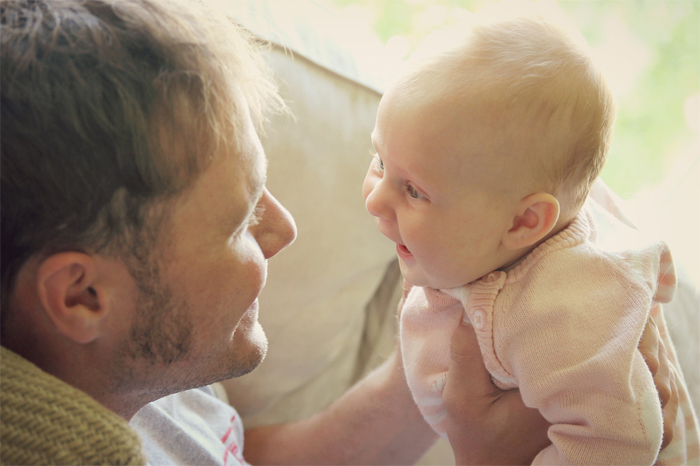Becoming a Dad
No one has to tell you that when you become a dad, your life is forever changed.
Although some fathers are able to invest emotionally in their children during their partner’s pregnancy, for others, it’s only when their child is born that they really start to have a relationship with it. Everybody becomes a father in their own way! During Pregnancy / Getting the news
This can bring varied types of reactions:
- Happy
- Shock
- Excited
- Speechless
- Proud

Your role is one of support. The best thing you can do for the mother of your child during this time is to be there for her. Bring her things so she doesn’t need to get up. Rub her feet. Dote on her. She’s going to be increasingly uncomfortable as the months tick by, and she’ll appreciate all the help you can give.
Go to as many Obstetrics appointments as you possibly can. Your partner is going to have lots of doctor appointments over the course of the pregnancy. They’re scattered around at first, with regular checkups and a couple of ultrasounds. By the third trimester, these visits become more frequent (and more intrusive for the woman).
As the male part of the pregnancy equation, you’re not required to attend these appointments, but transmitted at these things, and it helps to have an extra set of ears.
Always keep a notebook handy. You and your partner will probably come up with questions for the doctor almost every day throughout her pregnancy. Each time you think of a new question, jot it down in a notebook or note-taking app on your phone. Also track items of possible concern, like spotting, discharge, and pain so you can refer to them later if necessary. If your partner feels uncomfortable telling you about every intimate detail of her body, let her keep track of those notes, but encourage her to do so.
It’s also smart to keep a list of baby names that you and your partner want to consider. Every time either of you comes up with a new one, write it down if you both agree it’s in the running.
The First Trimester
The first trimester is uncomfortable for the woman. Her body is flooded with new hormones to prepare for what’s coming, and every woman’s body reacts differently. She will probably experience morning sickness, which despite its name can come on at any time of day. She may also have strange food cravings, feel fatigued, and have to go to the bathroom all the time. Her sex drive may go way up or way down. And since she’s not visibly pregnant yet, strangers won’t give her any preferential treatment.
The Second Trimester
The second trimester is usually a little easier than the first. Morning sickness starts to wane at this time, and although her belly is growing, the baby isn’t big and cumbersome yet. Still, it’s normal for her to become fatigued easily and experience shortness of breath.
You need to keep talking to her to find out how she’s doing, what she needs, and what you can do to make it easier for her.
Now is also a good time to take birthing and newborn care classes. These classes, usually available at hospitals or other medical facilities, provide you with great information about the process of childbirth and the basics of caring for newborns. They’ll give you booklets of information, but it’s also wise to take notes.
The Third Trimester
The baby is big now. By the time your partner enters the third trimester, she won’t be able to imagine how she could get any bigger. She also may experience the occasional Braxton Hicks contraction, which are like miniature versions of the real thing. By week 37 the baby is considered “full term,” which means labour could begin at any time.
At eight months, your partner should have her baby shower. This is by far the best way to stock up on baby gear, because it’s way cheaper to send a stack of thank you notes than to shell out cash for all the expensive stuff you’re going to need. And you’ll need a lot of stuff, from a crib and bassinet to clothes and car seats. It adds up fast.
Labour
Do you think you’re ready for labour? You are not ready for labour. Labour is intense and terrifying. It’s painful. The buildup takes hours, and then everything seems to happen at once. It’s grotesque, like something from a horror movie, but it’s heartbreaking because there’s nothing you can do to alleviate the pain. It can also be weirdly enchanting.
When it’s all over, take some time to be with your new family. Try to let it all sink in. You’re about to embark on an entirely new adventure. And get some sleep. You’ll need it.
Try not to feel that you’re “on the outside”
At the start it may feel as though your partner has more of a role in caring for your new child, especially if she is breastfeeding. But being part of the new family unit is about teamwork. Your role looking after the house, fielding telephone calls when your partner is trying to get some sleep, or going to the shops for new nappies is just as important to the family unit as feeding the baby.
You may feel that you’re more part of the family unit if you get involved from the very beginning. Some ways to do this could be:
- Attending antenatal classes
- Being present at the birth
- Learning how to change a nappy
- Finding out what is needed to look after a baby
- Speaking to any other fathers that you know
- As well as helping your partner, it will help you to feel part of the parenthood process.
Birth
When your child is born, you will probably be overcome by a wave of emotions. Do things at your own pace: cry, cuddle your child, watch him… Don’t hold this burst of emotions in check – they will help you to create a strong bond with your child.
Take your baby and hold him against your skin. This way, you can warm him up and he can discover his dad. This close contact will help strengthen the growing bond between you. If you feel too awkward to hold him on your own, get a midwife to put him in your arms for you.
Just after birth, your newborn baby finds himself in a completely strange new world. The first thing that will help him feel at home in this new world is his mum’s breast – which will make him feel wonderfully safe and secure. But you also have an important role to play. Go to your child; cuddle both him and his mum. In the little space that you create around him, he will find out that even when he is away from his mum, the world is not such a hostile place. Remember that you have a role to play and try not to feel like a visitor.
First months
You will be tired from having to get up many times during the night over the first few months and this can have a major effect on you: when you are suffering from a lack of sleep, all difficulties – even the most minor ones – can seem a lot more serious. Don’t underestimate what exhaustion can do. It’s the main cause of depression experienced by 50% of all fathers when their child is 4 to 6 months old. Feel free to get in touch with a midwife or your GP and get help if you feel exhausted.
For the first few months of your baby’s life, you should spend long periods of time having physical contact with him on a regular basis. This is vital for helping you to build a strong bond with him. Carry him – either in your arms or in a baby carrier – cuddle him, rock him to send him to sleep, wash him, and change him.
If your partner has chosen to breastfeed, support her without feeling excluded from this very special relationship: she will be providing your child with the best possible nourishment and her being able to do this is totally dependent on how dad reacts to this. You will be able to feed your child yourself once he has moved on to solids or when you want to vary his diet a little.
Games can often be a very good way for dads to communicate with their babies: starting in the first few months, invent fun activities for your newborn and enjoy laughing with him. This will lead to wonderfully joyful moments that you will remember for the rest of your life!
Parental leave
In Australia, there are entitlements regarding paid-parental leave and unpaid-parental leave. Feel free to look into all opportunities and ask your employer what you are eligible for. Us this time to share day-to-day life with your child during his first few days and enjoy this unique experience. You will also be helping your partner – who will need a lot of rest after giving birth.
Look after yourself
MensLine Australia has professional counsellors available 24 hours a day, seven days a week, providing confidential and anonymous information and support for all relationship issues. Call us on 1300 78 99 78 or register for online counselling.
Sex
Don’t forget about your partner during this time. While sex may not be on the agenda straight away, don’t forget to show your affection and love for your partner during this challenging time.
Sex might be the last thing on her mind in the early stages. However both of your sex drives will return to normal, you will just need to give it time. Her body has gone through some major changes, and it will need time to readjust. Her breasts will be full of milk for the baby, so finding positions that are comfortable for both of you may be a challenge.
Talking honestly with your partner about what you’re comfortable with is by far the most important part.
